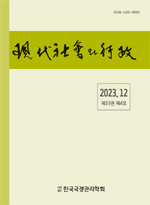본 연구에서는 한국에 체류하고 있는 이주민의 상호문화역량을 측정할 수 있는 검사 도구를 개발하고 전문가 델파이 조사를 통해 측정 문항별 타당도를 검증하였다. 이를 위하여 먼저 문헌연구를 통해 이주민의 상호문화역량 구성요소를 ‘태도’, ‘지식과 이해’, ‘기술,’ ‘실천’으로 나누었고 하위요소는 ‘개방성’, ‘존중’, ‘책임감’, ‘의사소통적 능력’, ‘문화적 자각’, ‘자기개발 능력’, ‘공감’, ‘행동의 유연성’, ‘협동력’으로 구현하였다. 그리고 이주민의 상호문화역량 측정을 위한 설문 초안을 도출하였다. 다음으로 이주민 대상 설문을 통해 59개의 측정 문항을 추출하였고 3인의 한국어교육 전문가를 통해 문항의 구성 및 문장의 어구를 사전 검사하였다. 또한 다문화사회 전문가 집단과 한국어교육 전문가 집단, 두 개의 그룹으로 나누어 전문가 델파이 조사를 실시하여 측정문항의 내용타당도(CVR)와 자료타당도(수렴도, 합의도)를 분석하여 측정도구의 타당도를 입증하였다. 그리고 전문가 집단의 합의가 이루어진 최종 53개 문항을 선정하였고 이주민의 상호문화역량 측정에 적합한 척도를 개발하였다. 결론적으로 본 연구는 이주민이 새롭고 낯선 문화적 차이가 현저한 환경에서 효율적이고 적절한 상호작용할 수 있는 역량을 측정할 수 있는 척도를 제시하였다.
This study developed an assessment tool to measure the intercultural competence of immigrants living in Korea, which is transforming into a multicultural society. The content and data validity of each measurement item were verified through a Delphi survey of experts. More specifically, as an initial step, we conducted a literature review and identified three main components of intercultural competence: attitude, knowledge and understanding, skills and practice. And the subcomponents were specified as openness, respect, responsibility, communication skills, cultural awareness, self development skills, empathy, behavioral flexibility, and cooperation skills. Following this, we drafted a survey questionnaire to assess the intercultural competence of immigrants, and selected 59 questionnaire items through a survey of immigrants. Then, three Korean language education experts reviewed the composition and wording of the questionnaire items. In addition, the study conducted a Delphi survey involving two expert groups: multicultural society experts and Korean language education experts. This survey verified the validity of the survey items by analyzing the Content Validity Ratio (CVR) and data validity of the questionnaire items (convergence and consensus). As a result, we selected 53 questionnaire items with consensus from both expert groups, and developed scale survey questions suitable for assessing the intercultural competence of immigrants. In conclusion, this study presents scales to assess the intercultural competence of immigrants for effective and appropriate interaction in a new and unfamiliar environment with distinct cultural differences.
Ⅰ. 서론
Ⅱ. 이론적 배경
Ⅲ. 연구방법
Ⅳ. 연구결과
Ⅴ. 결론 및 제언
참고문헌
(0)
(0)
